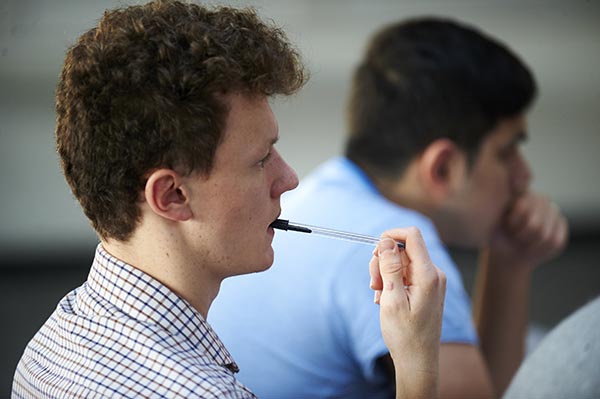
MSc Data Science (Artificial Intelligence and Statistics)
Combine data science, statistics and machine learning
Year of entry: 2026 (September)
This course produces data analysts with a focused specialism in data science, underpinned by formal training in advanced statistics, machine learning and artificial intelligence. As a graduate of this course, you'll be appropriately equipped to make significant contributions to your career and society as a whole.
The course builds upon your existing skills in mathematics and statistics (linear algebra, probability, statistics, coding) by developing advanced training in the field of data science. It encompasses a range of specialised domains such as temporal and data analytics and machine learning, fully underpinned by significant coding exposure. Interweaved across modules, the course harnesses three integrated strands that develop statistical, machine learning and computational thinking, with the seamless integration of these areas making graduates very attractive to employers.
You'll develop the technical skills needed to critically analyse, mine, and manage different kinds of data in order to learn, discover and interpret interesting patterns. You'll benefit and learn from our institutional expertise in statistics and machine learning.
Learn more about our range of data science and analytics Masters courses offered at York.
Course content
Your year of study with us culminates in a focused research project in the field of data science with an applied/industrial focus, which develops the necessary skills to be able to professionally contribute to solving complex industrial data analysis problems.
The skills you'll gain are useful for a wide range of range of sectors where data analysis is required, for example finance, sociology, health and medical sciences.
This course also lays an ideal foundation for further academic study should you choose to progress to a research degree.
Modules
Core modules
- Advanced Regression and Multivariate Analysis
- Statistical Pattern Recognition
- Statistics for Artificial Intelligence I
- Time Series
- Statistics for Artificial Intelligence II
Option modules
You will study one option module. Examples can be found below. Some option module combinations may not be possible. The options available to you will be confirmed after you begin your course.
Our modules may change to reflect the latest academic thinking and expertise of our staff, and in line with Department/School academic planning.
Dissertation
Learning outcomes
Every course at York is built on a distinctive set of learning outcomes. These will give you a clear understanding of what you will be able to accomplish at the end of the course and help you explain what you can offer employers. Our academics identify the knowledge, skills, and experiences you'll need upon graduation and then design the course to get you there.
Learning outcomes for this course
- Apply statistical, machine learning and computational techniques to solve applied data science problems, using skills for problem representation and data analysis, as well as for programming. [Data science thinking].
- Carefully examine and critically analyse advanced statements, arguments or conjectures that underpin the theoretical assumptions of statistical and machine learning techniques in order to justify the chosen data analysis strategies. [Analytical skills].
- Develop and apply advanced statistical, machine learning and computational techniques for critical data analysis and data mining, in order to learn and discover meaningful data patterns and knowledge for real world applications. [Statistical Data Science].
- Display mastery in tackling new and unfamiliar challenges in statistical data science, recognising appropriate ideas and approaches drawn from a range of advanced statistical and machine learning techniques. [Adaptability].
- Analyse and apply statistical data science skills to practical problems and real-world datasets collected in collaboration with industrial partners, in a safe, ethical, and secure way. [Professionalism].
- Employ advanced skills to conduct self-directed research aimed at carrying out specific tasks as shaped by current methodologies. [Independence].
- Communicate complex ideas in statistical data science and the discovered knowledge in a clear and organised manner, and present an effective summary of these ideas. [Communication].
Fees and funding
Annual tuition fees for 2026/27
| Study mode | UK (home) | International and EU |
|---|---|---|
| Full-time (1 year) | £13,900 | £32,900 |
Fees information
UK (home) or international fees? The level of fee that you will be asked to pay depends on whether you're classed as a UK (home) or international student. Check your fee status.
Find out more information about tuition fees and how to pay them.
Funding information
Discover your funding options to help with tuition fees and living costs.
We'll confirm more funding opportunities for students joining us in 2026/27 throughout the year.
If you've successfully completed an undergraduate degree at York you could be eligible for a 10% Masters fee discount.
Funding opportunities
Chevening Scholarships
We are pleased to work with Chevening Scholars to offer funding for our Masters programmes. Chevening Scholarships provide one year of fully-funded postgraduate study in the UK for international (including EU) students. The scholarships are open to early and mid-career professionals who have the potential to become future leaders.
Teaching and assessment
You’ll work with world‐leading academics who’ll challenge you to think independently and excel in all that you do. Our approach to teaching will provide you with the knowledge, opportunities, and support you need to grow and succeed in a global workplace.
Teaching format
We use a wide range of teaching methods to suit different learning styles including:
- Lectures
- Problems classes
- Seminars
Lectures are used to describe new concepts you will have to learn and problems classes put them into practice. Seminars are small, interactive sessions which allow us to focus on your individual needs.
While you're working on your project and your dissertation you'll have regular meetings with an academic supervisor who can offer advice and support. We aim to give you a supervisor with specialist knowledge of the area you're investigating.
Teaching location
You will be based in the Department of Mathematics in James College on Campus West. Most of your small group teaching will take place in the Department's dedicated MSc seminar room (the Dusa McDuff room), with larger classes taking place close by in James College, Derwent College and elsewhere on Campus West.
About our campus
Our beautiful green campus offers a student-friendly setting in which to live and study, within easy reach of the action in the city centre. It's easy to get around campus - everything is within walking or pedalling distance, or you can always use the fast and frequent bus service.
Assessment and feedback
For the majority of taught modules, assignments are set every fortnight. These assignments will help you develop your skills and identify areas for improvement. You'll receive verbal and written feedback during seminars, when you'll have a chance to discuss your work.
Most modules' final assessments take the form of closed exams. You'll be able to see past papers ahead of each exam which will give you an idea of the topics which may be covered and the level of complexity involved.
You'll also be assessed on presentations, project reports and your final dissertation.
Careers and skills
Data scientists are in high demand across many industries, and this course will prepare graduates for work as technical experts in the statistical and computational tools underpinning industrial applications. A focus on employability will be built into many of the modules, with contributions from employers and real-world problems motivating much of the theory. In addition, we will develop Applied Industrial Data Science projects to expose students to work.
Career opportunities
- Data scientist
- Research scientist
- Research software engineer
- Science policy advisor
- Data analyst
- Informatician
Transferable skills
- Team working
- Self-management
- Application of IT and numeracy
- Problem-solving
- Communication and literacy
- Consultancy skills
Entry requirements
| Qualification | Typical offer |
|---|---|
| Undergraduate degree | 2:2 or equivalent undergraduate degree in Mathematics or in a subject with a substantial mathematical component |
| Other international qualifications | Equivalent qualifications from your country |
English language
If English isn't your first language you may need to provide evidence of your English language ability. We accept the following qualifications:
| Qualification | Minimum requirement |
|---|---|
| IELTS (Academic and Indicator) | 6.5, minimum 6.0 in each component |
| Cambridge CEFR | B2 First: 176, with 169 in each component |
| Oxford ELLT | 7, minimum of 6 in each component |
| Oxford Test of English Advanced | 136, minimum 126 in each component |
| Duolingo | 120, minimum 105 in all other components |
| LanguageCert SELT | B2 with 33/50 in each component |
| LanguageCert Academic | 70 with a minimum of 65 in each component |
| Kaplan Test of English Language | 478-509, with 444-477 in all other components |
| Skills for English | B2: Merit overall, with Pass with Merit in each component |
| PTE Academic | 61, minimum 55 in each component |
| TOEFL | 87, minimum 21 in each component |
| Trinity ISE III | Merit in all requirements |
For more information see our postgraduate English language requirements.
If you haven't met our English language requirements
You may be eligible for one of our pre-sessional English language courses. These courses will provide you with the level of English needed to meet the conditions of your offer.
The length of course you need to take depends on your current English language test scores and how much you need to improve to reach our English language requirements.
After you've accepted your offer to study at York, we'll confirm which pre-sessional course you should apply to via You@York.
Next steps
Contact us
Get in touch if you have any questions
Department
Related courses
- Data Science (MSc) (Department of Computer Science)
- Data Science (Human Behaviour) (MSc) (Department of Psychology)
- Data Science (Scientific) (MSc) (Department of Chemistry)
- Bioinformatics (MSc) (Department of Biology)
- Business Analytics (MSc) (School for Business and Society)
Discover York







